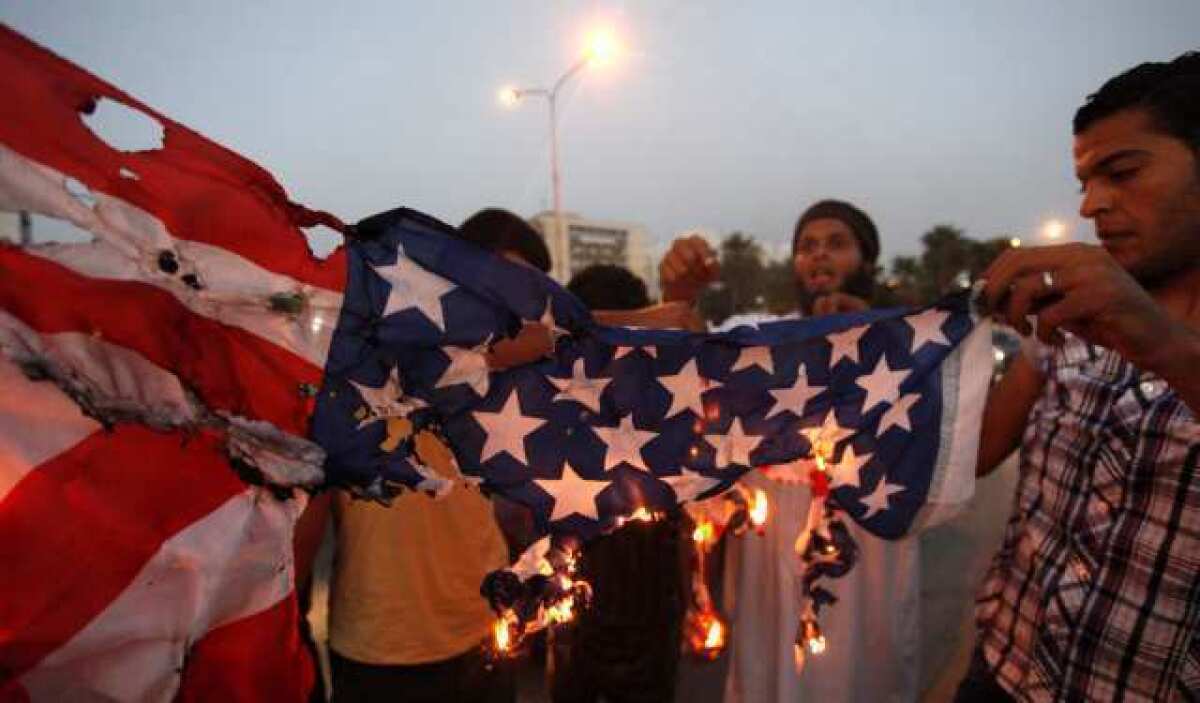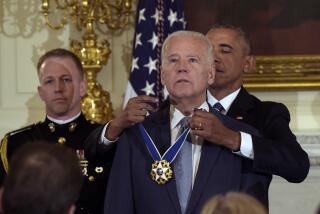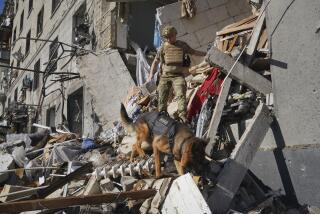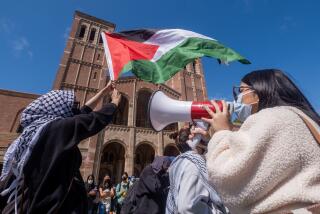Is Romney’s best opening now on foreign policy?

It’s been delivered wisdom for going on two years that President Obama’s reelection would hinge on how the public felt about jobs and the economy and what the incumbent did to boost both. But as the presidential race enters its final six weeks the president looks more vulnerable, at least for now, on the topic of instability in the Mideast and what to do about it.
It’s unlikely the focus of the campaign will change radically, but recent events suggest at least a partial reboot. The public’s view of the economy has improved, at least nominally, at the same time that pictures of turmoil in the Middle East and North Africa have filled television screens. That could change perceptions about where Obama is vulnerable.
Shortly after the death of J. Christopher Stevens, the U.S. ambassador to Libya, an NBC/Wall Street Journal poll found approval of the administration’s foreign policy at 49%, among the lowest marks Obama has received since taking office.
Obama’s advisors have given evolving explanations about the root of the attacks in Libya and on the U.S. Embassy in Cairo. An “Accountability Review Board” has been appointed by Secretary of State Hillary Rodham Clinton to explore the circumstances of the Libya attack.
PHOTOS: U.S. ambassador killed in Libya
But many Americans won’t wait for a panel of experts to conclude that, if a U.S. diplomat has died, those responsible did not provide enough security. When you are president, the public is almost always going to count you high on the list of “those responsible.”
Managing democratic aspirations in the Muslim world presents no easy answers. Americans want to support the right of all people to govern themselves, but when the resulting elections produce winners who take on the air of religious extremists, the self-rule sheen quickly fades.
Obama has walked this line somewhat unevenly, in some cases speaking forcefully for democracy movements — as when he called in early 2011 for the ouster of Egyptian President Hosni Mubarak — and sometimes treading more cautiously, as he has in giving only rhetorical support to freedom fighters battling Bashar Assad’s regime in Syria.
Video of burning American flags and anti-U.S. protests doesn’t seem likely to inspire support for the Obama administration, regardless of whether another leader would have any better clue on how to help tame the restive movements half a world away.
Meanwhile, not just routine Obama critics but mainstream media outlets such as CNN have been asking for the last two days why Obama, while visiting New York for United Nations meetings, had time to appear on the daytime talk show “The View” but not to meet with world leaders.
PHOTOS: Mitt Romney’s campaign gaffes
CNN’s Brianna Keilar reported Tuesday on how President Clinton, President George W. Bush and even Obama, a year ago, used the U.N. session to meet with foreign heads of state. The CNN report suggested the administration wanted to avoid the leaders in order to reduce the chance of a misstep or controversy.
Obama’s team pushed back on that notion, saying the president simply had other things to do and speaks frequently to foreign leaders via telephone.
A New York Times report this week pegged Obama’s failure to form relationships with other world leaders as a “character trait.”
“He has not built many personal relationships with foreign leaders,” the story said, then quoting an unnamed U.S. diplomat, who added: “He’s not good with personal relationships; that’s not what interests him. But in the Middle East, those relationships are essential. The lack of them deprives D.C. of the ability to influence leadership decisions.”
PHOTOS: Mitt Romney on the campaign trail
CNN commentators Fareed Zakaria and David Gergen spent much of an extended segment with anchor Anderson Cooper on Tuesday night agreeing that Obama needed to do more to build such personal relationships. Gergen noted that President George H.W. Bush used such connections to great benefit in building a broad coalition to help the U.S. in the Persian Gulf War. The two commentators said it was wrong to put campaign events ahead of international diplomacy.
The misgivings about Obama’s foreign policy performance could present an opening for Romney, but only if the public views him as a credible alternative. He harmed that cause in some voters’ eyes when he precipitously blamed Obama for “apologizing” for U.S. values in the wake of Stevens’ death and even argued that the president cared more about the extremists than those they harmed. Only Obama’s most vehement detractors are likely to accept that one.
Peggy Noonan and John Sununu, stolid Republicans, called that Romney response a misfire. Americans want a leader who is more substantial, Noonan said — one who presents big alternatives. Romney has six more weeks to prove that he is that leader.
Follow Politics Now on Twitter and Facebook
Twitter: @latimesrainey
MORE COMMENTARY FROM JAMES RAINEY
Would President Obama try stimulus spending again?
The truth behind the ‘Khalidi video’ and why it’s not for sale
New Yorker: Romney like guy speaking at ‘50s Rotary luncheon
More to Read
Get the L.A. Times Politics newsletter
Deeply reported insights into legislation, politics and policy from Sacramento, Washington and beyond. In your inbox three times per week.
You may occasionally receive promotional content from the Los Angeles Times.











